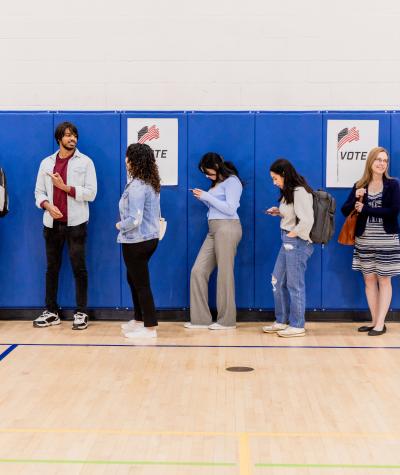Voters have a right to know that the officials who write, implement and interpret the laws that govern this land are prioritizing the greater public good over their own personal interests.
But just a few days away from a presidential election, the perception that many voters have toward candidates for public office — and whether they are trusted leaders of the public good — seems more dubious than hopeful.
This has become especially noticeable among our newest voters; young Americans are incredibly consequential as a voting bloc but are arguably the least enthusiastic about their options according to polling.
There are nearly 42 million 18- to 27-year-olds who will be eligible to vote this November, and they are not impressed. According to the Berkeley Institute of Young Americans, “many young voters appear to share a belief that fractured, dysfunctional government systems are incapable of addressing critical challenges that fall heavily on their generations.”
In addition, a Harvard Youth Poll found that, amongst growing concern for the country’s general direction, confidence in public institutions has been on the decline over the last year.
Increasing political efficacy will always be a complicated pursuit for candidates seeking public support. But maintaining ethics as a fundamental principle for our government is a key factor in this trust — without it, turning out America’s latest generation of voters will only continue to be a struggle.
Recent years have shown a continuous pattern of elected and appointed officials skirting the law and ignoring best practices, often due to a lack of accountability. Politicians often don’t feel the immediate political consequences of their unethical behavior, if they ever feel it at all.
Overwhelmingly, we rely on elected officials to self-police. But choosing to place accountability in the hands of public officials rather than independent oversight bodies has proven to not work.
Members of Congress notoriously flout ethics guidelines like stock disclosure requirements and rarely find each other guilty during internal investigations.
This problem is even more present in the Supreme Court. Justices routinely reject efforts to establish an independent ethics committee, and enforcement is instead left to the Judicial Conference of the United States, which often refuses to investigate even the most obvious signs of questionable behavior.
From the Supreme Court to the U.S. Senate, the common theme seen among these violations is that ethics enforcement is not a primary concern for those in charge.
Even when new administrations promise to enact change that keeps the government working for the people, these priorities fall by the wayside; the Biden administration is reaching its conclusion and has yet to pursue any of the major ethics overhauls candidate Biden promised on the 2020 campaign trail.
But this election cycle, we may be inching closer to our ethics problem having consequences at the ballot box.
For years, CLC has been sounding the alarm that a bad ethics report card erodes public trust in institutions.
Americans are starting to question whether officials are working to advance the public interest or line their pocketbooks and are increasingly skeptical that their political participation can move the needle on the most important policy issues.
Just weeks before an election, this disillusionment spells trouble for voter turnout.
The Supreme Court especially is suffering a lack of public favor: “In the last twelve months alone, trust in the U.S. military and the Supreme Court to do the right thing ‘all’ or ‘most of the time’ has fallen by 10 and nine percentage points, respectively.”
This is unsurprising — oftentimes when Supreme Court justices make headlines, it’s for major ethics violations.
We are seeing the long-term effects of justices skirting financial disclosures and representatives stock trading on insider knowledge — far beyond the immediate negative consequences of ill-motivated political decisions, these violations have eroded public trust within the burgeoning American society.
Enabling and supporting the youth vote has always been a struggle on a practical level — actors motivated to suppress the youth vote have several proposed policies and Election Day tactics in their toolbelt to keep Gen Z’s voice out of elections.
Now, politicians are failing to give young voters a reason to even make their voices heard.
At their best, ethics laws and rules at the state and local level help increase transparency and hold those in public service accountable when they undermine the public’s trust and fail to behave ethically.
At their worst, they do not go far enough to prevent ethics violations and cultivate a culture of corrupt behavior that most voters dislike.
We need to reform ethics codes and prevent the erosion of public trust in our institutions that turn away voters, especially Gen Z, from making their voice heard. The health of our democracy depends on accountable, inclusive and transparent processes at all levels of government.

